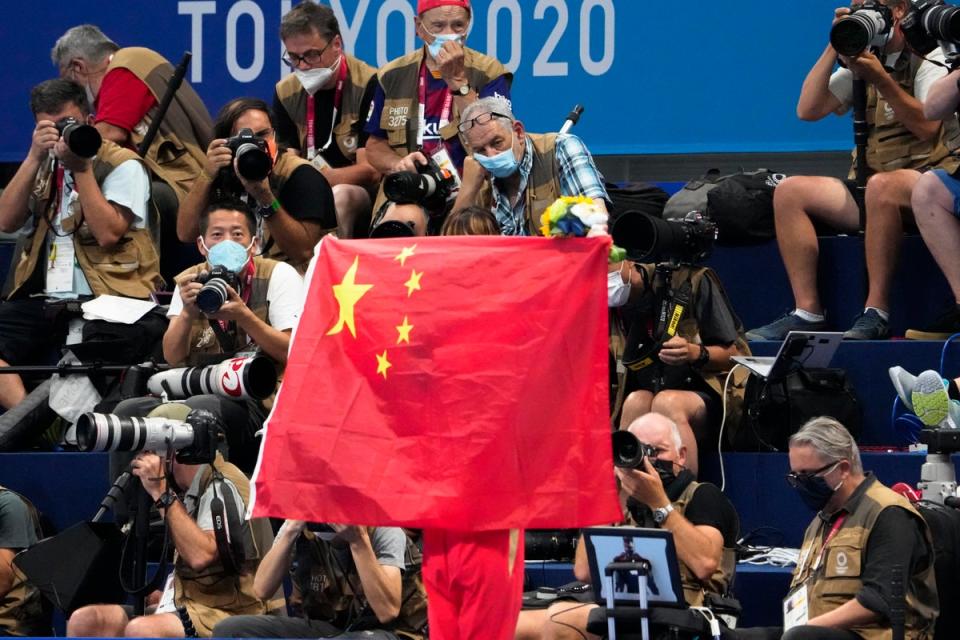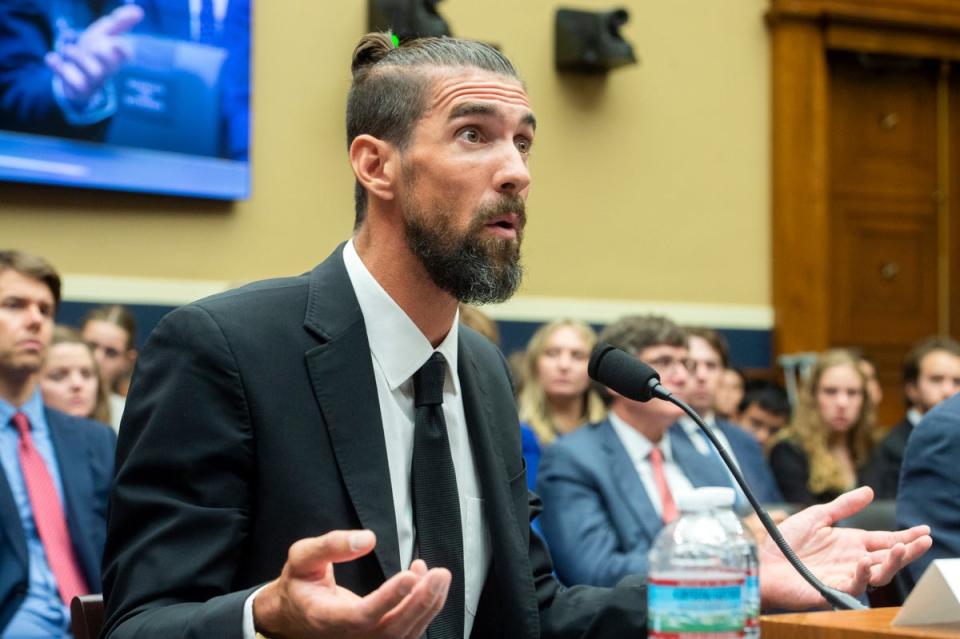Swimming suffered a blow in 2024 after the World Anti-Doping Agency (Wada) processed the Chinese swimming team’s positive test results ahead of the 2021 Tokyo Olympics.
The story, reported by the New York Times and German news organization ARD, involves 23 Chinese swimmers, 11 of whom will compete in the Paris Olympics, who tested positive for the heart drug trimetazidine (TMZ) during a training camp seven months before the 2021 Tokyo Olympics. And the scandal has spread to the Paris Games, with Chinese swimmers angry about their rivals’ “tricks.”
It has China’s Zhang Yufei, a gold medalist in the women’s 200-meter butterfly and 200-meter freestyle relay, and Wang Shun, who won gold in the men’s 200-meter individual medley, among those set to compete in Paris, NBC reports. Crucially, the results only came to light this year, when China’s anti-doping agency (Chinada) alleged the swimmers had inadvertently ingested the substance due to contamination.
There have been allegations of cover-ups by some national federations, which have been met with “fake news” responses from China. However, there is anger after the doping agency cleared the Chinese swimmers but suspended Russian figure skater Kamila Valieva, who also claimed to have been infected by TMZ before competing in the 2022 Winter Games in Beijing. Here’s how the scandal came to light and what we know ahead of the Paris Olympics:
How did it all start?
On April 22 of this year, Wada, with thanks to Ross Wenzel, then general counsel and former outside counsel, provided a detailed description of the events of 2021.
Wenzel said that Chinese anti-doping authorities collected 60 urine samples during a national swimming competition on January 3, 2021. On March 15, Chinada told Wada that it had discovered 28 positive tests.
In May, Chinada said it had found traces of the banned substance in a hotel where all 23 athletes were staying. In particular, the traces were reportedly found in spice jars in the hotel’s kitchen and drainage units.
On June 15, the organization Wada announced that the swimmers would not be charged with doping violations. According to the organization, the positive tests were the result of contamination.

What is trimetazidine (TMZ)?
Trimetazidine, or TMZ, can be used to treat angina and other heart-related conditions. It has been on Wada’s banned substances list since 2014 due to its potential to improve endurance and blood flow.
How did it end up in the kitchen of the Chinese swimmers hotel?
Wenzel said in his investigation that Chinada did not get individual testimonies from the 23 Chinese swimmers about how the substance appeared in their samples. Athletes who claim contamination are typically required to provide an explanation for the potential or likely source of contamination.
Wenzel said Chinada “did not hypothesize in their report” why traces of a banned heart drug were found in the kitchen of a hotel where top swimmers were staying during the competition.
“The ultimate source, how TMZ got into the kitchen, has not been discovered,” Wenzel said.
What did Wada do and what could it have done?
Wada officials said that due to the widespread cases of Covid-19 in the region at the time, an investigation in China was not possible.
Wada investigated the circumstances and ruled out microdosing. However, according to Chinada, who stayed at the same hotel, the positive tests were limited to athletes.
“All of these athletes were in the same place at the same time when the positive results occurred, and all of these sample results were consistently at a low level,” Wenzel said.
Wada had the option of suing Chinada at the Court of Arbitration for Sport (CAS), but ultimately decided not to do so in July due to insufficient evidence and legal advice on the likelihood of the explanation for the contamination being refuted.
Wada considered the athletes innocent and did not release details of the case before the Tokyo Olympics, where China’s 30-person swimming team won six medals, including three gold.
Why was the case not made public?
Given the presumption of innocence, the national anti-doping body cannot find a violation and is not required to make details of a case public. Wada would only discuss a case publicly if Chinada did so or if it intended to refer the case to CAS.
Wada President Witold Banka said: “It’s a question of whether you want to expose the innocent athletes or not, right? We have to take into account that by publishing the names of athletes without violating the anti-doping rules, you expose the innocent athletes and you can damage their image. So this is a discussion that is very important, and our role is also to protect innocent athletes.”
What did the independent investigation reveal?
The scandal led to an independent investigation, which concluded in July 2024 that Wada was not biased in the case of 23 Chinese swimmers who were cleared to compete in Tokyo despite the athletes testing positive for a banned substance.
The interim report by Swiss prosecutor Eric Cottier also said it was reasonable for Wada not to appeal Chinada’s decision not to punish the athletes.
According to the appendix to Cottier’s report, Olivier Rabin, Wada’s senior director of science and medicine, had “doubts about the reality of the contamination as described by the Chinese authorities”.
But no action was taken because he “could not rule out the contamination scenario in a well-founded manner” and ultimately “he saw no other solution than to accept it”.
Wada also explained that it was “not in a position to refute Chinada’s story” with independent experts and outside legal advisors helping to make the decision not to appeal.
What was said?
The scandal led to Michael Phelps, Adam Peaty, Katie Ledecky and others launching a fierce attack on the anti-doping agency, fearing it would erode trust among athletes ahead of the biggest swimming competition in four years.
Phelps said athletes can no longer place their trust in Wada: “As athletes, we can no longer blindly place our trust in the World Anti-Doping Agency, an organization that continues to prove itself unable or unwilling to consistently enforce its policies around the world,” Phelps said.
“It is clear to me that all attempts at reform at Wada have failed and that there are still deep-rooted, systemic problems that have proven time and again to be damaging to the integrity of international sport and the right of athletes to compete fairly.”
Travis Tygart, CEO of the United States Anti-Doping Agency (USADA), called the story “devastating” and claimed that the global and Chinese anti-doping organizations “have so far secretly swept these positives under the rug.”
FairSport and Global Athlete stress that Wada’s process was “inherently flawed from the outset due to its limited scope and independence”.
The joint statement continued: “Until all relevant documents are made public, trust in the system will not be restored and Wada’s position as a global regulator will continue to be challenged.”
Allison Schmitt, who was part of the U.S. team that missed out on gold to China in the 800-meter freestyle relay at the Tokyo Olympics, said: “We raced hard. We trained hard. We followed every protocol. We respected (China’s) performance and accepted defeat. But now that I know the Chinese relay was made up of athletes who had not served suspensions, I look back on it with doubt. We may never know the truth and that will haunt many of us for years to come.”


What happens now?
Wada Chairman Witold Banka welcomed the independent report and its conclusions, while examining “what measures can be taken against those who made untrue and possibly defamatory allegations”, saying the case was being used “as a geopolitical tool” in the broader conflict between China and the United States.
According to World Aquatics, Chinese swimmers must be tested for drugs at least eight times this year.
World Aquatics said “a certain number of athletes from specific countries will be tested four times” in 2024 by the Lausanne-based International Testing Agency, which manages anti-doping programs for many Olympic sports.
But the umbrella organization added that Chinese athletes competing in Paris “will be tested by the ITA at least eight times during the same period.
Ideally, the samples are not carried out by Chinada, but the tests are preferably also carried out in laboratories outside China.